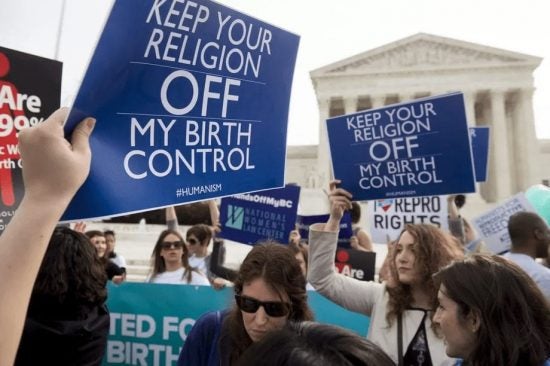
Image courtesy of Vox
The day after the midterm elections, the Trump administration released a series of new rules likely to have a troubling impact on American women’s access to reproductive care. The first two are final rules that significantly expand the ability of employers to refuse to cover contraception on religious or moral grounds, while the third is a proposed rule that complicates insurance coverage of abortion services. Together, these rules will likely reduce the availability of plans covering the full range of contraception options and cause some insurance providers to forgo covering abortion altogether.
The first two rules dramatically expand the category of employers exempt from the Affordable Care Act’s contraceptive mandate. Under current law, “houses of worship” are exempt from the mandate while nonprofits and closely-held for-profit companies are provided an accommodation to the rule. Employees of exempt organizations bear the full cost of contraception coverage themselves, while insurance providers or third party administrators step in to pay the full cost of contraception for employees of entities with accommodations.
Once the new rules take effect in January, almost any employer will be able to refuse to provide contraceptive coverage to their employees at any time. The first rule exempts entities with sincerely held religious objections to contraceptive services while the second exempts those with similar objections on moral grounds. Among others, these rules exempt institutions of higher education, publicly-traded for-profit companies, and nonprofits with qualifying objections.
Critically, it will be difficult to determine just how many women are likely to be affected by or how many employers are expected to take advantage of these new rules. Unlike employers granted accommodations, there is no requirement that exempt employers notify the government of their intentions. The Department of Health and Human Services estimates that the rules will affect between 6,400 and 127,000 women and no more than 200 employers – but the lack of notice and ease of exemption means the true number could be much higher.
These rules deprive an employee of her ability to make decisions regarding contraceptive use. Under the current accommodation scheme, employees maintained this ability, even while objecting employers were able to avoid the transaction altogether. By exempting almost any objecting employer, the administration takes this deeply personal decision out of the hands of the patient, allowing her employer or university’s morals or religious beliefs to determine her access to medical care.
The third rule intentionally increases both administrative costs associated with and consumer confusion related to plans that include abortion coverage. Under current rules, patients can pay their premium for abortion coverage and non-abortion coverage in the same check. The new rule separates these transactions, requiring insurers to send – and the estimated 1.3 million affected patients to pay – two separate bills in two separate envelopes. This doubles the cost of postage, drastically increases paperwork, and decreases insurer incentive to offer these plans. A confused patient who mistakenly pays only one of her health insurance bills risks termination of her entire plan.
Together, these rules reduce access to reproductive care for millions of Americans.



